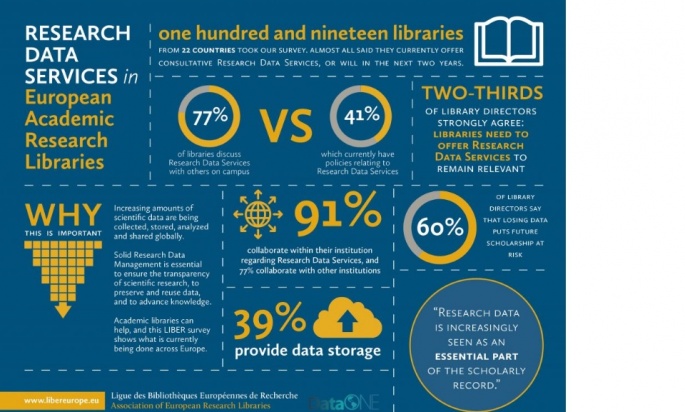LIBER-DataONE survey on Research Data Services in Academic Research Libraries

.jpg)
(Image credit: LIBER)
The present survey on Research Data Services - carried out by a group of internationally renowned researchers in collaboration with LIBER’s Scholarly Communication & Research Infrastructures Committee and DataONE - reflects answers from a representative sample of research libraries in 22 European countries.
__________________________________________________________________________________________________
“Research data is an essential part of the scholarly record, and management of research data is increasingly seen as an important role for academic libraries”, - Survey on Research Data Services (RDS).
RDS provided by libraries vary and may include:
- Creation and management of institutional data repositories,
- Providing tools for data mining and visualization,
- Training for researchers on data management activities,
- Guidance on institutional policies,
- Help with creating data management plans and metadata for data sets, and
- Assistance with intellectual property and privacy issues surrounding research data,
and other services.
To discover what types of RDS are being offered by European academic research libraries and what services are planned for the future, an international research team funded by Association of European Research Libraries (LIBER) and Data Observation Network for Earth (DataONE) conducted (in the spring 2016) a survey of LIBER academic members - from a representative sample of research libraries in 22 countries across Europe.
The survey instrument from earlier DataONE surveys of academic libraries was revised and pilot was tested by several European academic library directors.
Research questions that drove this study were:
- Are informational/consultative RDS offered by more European libraries than technological RDS, as in North American libraries?
- Are more European libraries planning to offer RDS in the future than currently offering RDS, as in North American libraries?
- How are European libraries developing staff capacity for RDS?
- Who are European libraries collaborating with on RDS?
- What types of data are supported by European libraries which offer RDS?
- What are the attitudes towards RDS among European library directors?
- Are there differences in RDS offered by libraries in different regions within Europe?
Overall, the survey found that two-thirds of library directors strongly agree on the importance of RDS.
Libraries are currently offering more consultative-type RDS services (e.g. how to find information on Data Management Plans, metadata standards, or data citation practices) than technological services (e.g. own storage solutions).
The survey also revealed that less than half of libraries say their institutions currently have policies relating to RDS.
Less than a third of the libraries have services that involve direct participation with researchers on a project, while another third have no plans to offer such services in the future.
The full results of the survey can be downloaded here.
The raw data underlying the survey has also been published on ZENODO.

